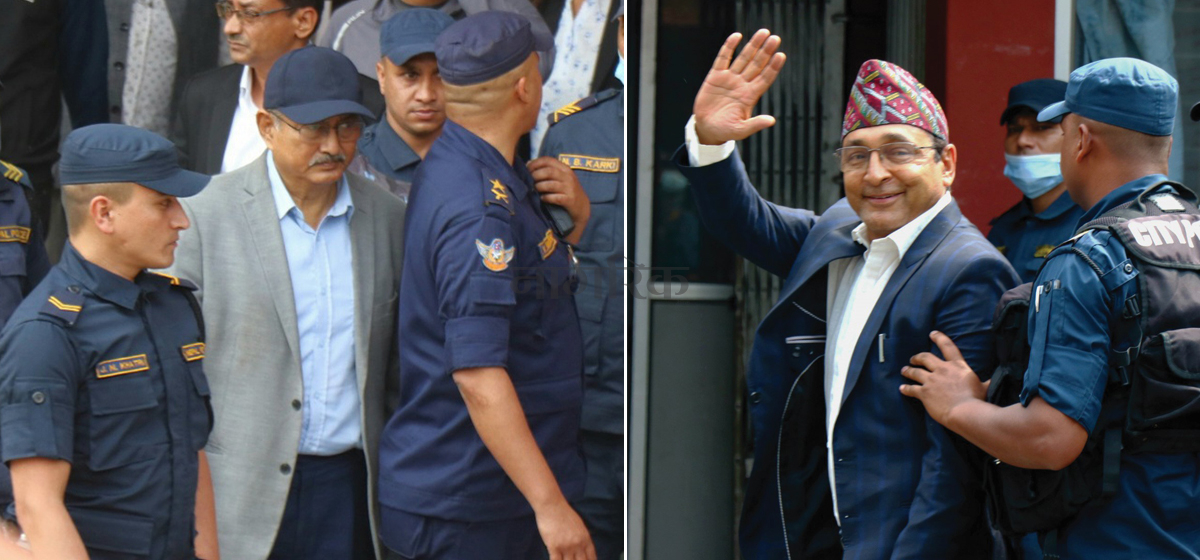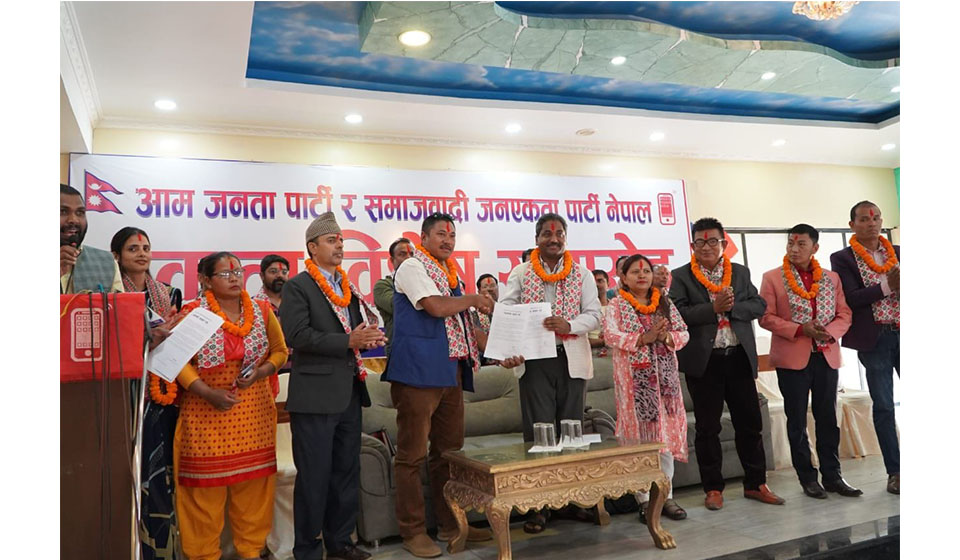
OR
Opinion
A troubling nexus between crime and politics
Published On: July 15, 2023 08:33 AM NPT By: Devendra J. Subedi


Devendra J. Subedi
The author is Additional Inspector General (Retd.) of Nepal Policenews@myrepublica.com
More from Author
Crime in politics and politics in crime is a phenomenon prevalent in less developed countries. It has become a major obstacle in practicing democratic ideals and the rule of law in such countries. Transnational nature of crimes, professional characters of those involved in crimes and disproportionately huge profit generated through such acts have given rise to organized crime, making people with such backgrounds all powerful ‘non-state actors’ to influence the country’s vital policy. Non-state actors involved in organized crime create a resourceful, vicious clout parallel to legitimate state power. This resourceful power clout becomes influential in the process of state functioning, policy formation, and ultimately lawmaking. The evidence on the ground is sufficient to explain their influence over the state in present-day Nepal, and there is no need for in-depth research or data-based analysis to understand these phenomena.
A political system that is solely accountable to the people can only function through a parallel but balanced distribution of responsibility, authority, and accountability. Considering non-state actors as integral characters within the system is not only dangerous but also poses a precarious situation, with the risk of the system collapsing as the outcome. It is an indicator of an unavoidable reality that lies ahead within the system itself. A number of social and economic factors are available to recognize the dangerous elements and bring them into state power. However, promoting a conducive environment to strengthen them day by day in a poor country like Nepal is fatal in itself. Exerting power easily in creating perpetual influence, pressure, and crisis in the day-to-day operations of various layers of government demonstrates that they have easy access to grab positions in policy and law making or manipulate the system from behind the scenes with immunity, turning the players of the system into their stooges.
It is not surprising to declare that an "ecosystem structured to comfortably satisfy mutual greed" is so powerful that it won't take long to transform the competency of the established system into an "impotent system of docile machines." Under the influence and cover of power politics, these non-state elements can protect and expand their illicit activities, illegal operations, and gray businesses, extending part of the benefits to the politicians in power. This is not a new phenomenon in Nepal, as these elements maintain their hold on state power through influence, while silently sharing the gray benefits with the government in exchange for policies that suit their interests in the short and long terms.
This double-sided and mutual connection undeniably strengthens the influence of non-state actors over the political and administrative levels of the state. Similarly, the use of criminal profitability is not a new phenomenon in politics either. However, the question arises: what inspires political groups and leaders to surpass their stated ideals of people's welfare and preservation of the good system? It's no secret that political groups and leaders regularly receive enormous benefits for protection of non-state actors in exchange for various forms of logistical support, along with hefty protection fees. This inspires the "adventure-loving" instincts of political leaders, which, in fact, manifest in becoming protectors of criminals. With readily available muscle power to create a sense of fear among the populace whenever the need for physical protection and political campaigning arises, political groups and leaders become ensnared in the greed of organized criminal gangs, which have no legal bindings or accountability like the police force does. This encourages their inclination towards gangs or hooligan clubs, resulting in a trade between gangs and politics. Clearly, it becomes a barter system or trade exchange between political parties and non-state actors in the form of organized gangs.
Beyond trade between gangs and politics
The trend of accepting protection of criminals as an indicator of the dependable and influential strength of a political party or group within society and appreciating such achievements within the political party itself encourages leaders to internalize it as a hallmark of successful leadership. Political leaders do not even hesitate to ignore the gross impact of organized crime for their petty interest. They have ample logic to justify organized crime and easily mislead the people.
For the state mechanism that readily provides a conducive environment for the involvement of even the police in the transportation of counterfeit paper currency and in gold smuggling, it is not a great deal to exchange the illegal and well-covered profits for political protection of the organized criminals. This is just one example. If we look beyond this point, we can easily understand political leaders' obsession with criminal activity. It is quite obvious in countries like Nepal, where long political struggles for various forms of ideologies have resulted in wider violations of law and order. And in extreme cases, violence takes the form of personal vendettas.
People easily get swayed away by the flow of emotional or sentimental narratives as propounded by their leaders. This vicious aim is not to develop a peaceful, law-abiding society but rather to justify criminality and derive benefits from the unseen profits and influence of criminals as needed. This is where democratic values completely collapse and enter into an illegal barter with criminals. On the other hand, the entire society is thrown into emotional confusion, preventing them from escaping the clutches of their leaders. As a result, social credibility, a prerequisite for establishing the 'Rule of Law' in a democratic society, is severely undermined by the political parties and their leaders, creating 'Emotional Confusion." The framework of the "Rule of Law," which ideally envisions social development and prosperity achieved through a democratic system endorsed periodically by popular vote, is plagued by the traditional and modern practices of crime in politics. Balancing these two paradoxes simultaneously has become the harsh reality of today's political scenario in Nepal.
Vicious cycle of ‘influence’ in state apparatus
In such a scenario, there is a need to find a balance between democratic values and crime in politics. It is evident that "non-state actors" are invited to fulfill the vested interests of the government and the administration. Legitimate businesses, industries, and trade form the economic foundation of the country, making their advice, suggestions, or influences acceptable in partnership with the government. However, vested interests can easily exploit the fractured political and administrative integrity. This creates a gray zone conducive to organized crime, cleverly masked under legitimate business or trade.
Within this gray zone, "advice and assistance" appear but manifest as "manipulation." This manipulation transforms under-the-table works into legitimate businesses in appearance, but their essence is illegal profit-making. In this way, the state itself becomes susceptible to manipulation. This stage further leads the state to become a partner in the enormous profits made by non-state actors who manipulate government officials through established nexuses. Consequently, an illegal financial empire emerges parallel to or surpassing the formal economy of the country in many cases. To understand this phenomenon easily, ‘commission agents’ become influential in the government's budget policy and persuade the government to allocate funds to projects that allow them to extract commissions for their intermediary work. Furthermore, they create a favorable environment for their projects through various means of influence, including bribing. The success of non-state actors in such areas is only a partial example illustrating their influential role in the state mechanism.
As it progresses to the second stage of influence, their choice or consent for the appointment of decision-makers in the state mechanism becomes undeniable for state affairs. Ultimately, it reaches the top stage where the state cannot function without protecting and accommodating the interests and concerns of non-state actors in the formulation of laws, regulations, policies, and even government work procedures. Within the illegal financial empire built through such collaboration, non-state actors gain the status of full-fledged but undeclared decision-makers, albeit behind the scenes. The bureaucracy within the state mechanism feels secure and benefits solely through the loyalty of non-state actors since their choices become decisively important for obtaining powerful positions within the state mechanism. Consequently, the bureaucracy starts aligning itself in front of the hidden doors of the non-state actors. Those who prioritize professional integrity become obstacles to the free movement of the illegal nexus comprising political power, non-state actors, and the bureaucracy. They are either sidelined or systematically marginalized while new government service recruits are groomed for power positions as part of a long-term strategy.
Under the influence of non-state actors and the cover of political power, the bureaucracy makes decisions that favor vested interests, eventually transforming the administrative structure into a "stooge." We don't need to look far to find a practical example of this; it is right here under our noses. The ongoing incidents reveal compelling evidence of the dangerous presence of non-state actors in the state mechanism and the two-faced nature of crime in politics. However, we still need to wait and see what cost the nation will have to pay in the future due to this situation. Controlling the intertwining of crime in politics and politics in crime has become increasingly difficult. In this context, a crucial question arises regarding how law enforcement agencies, particularly Nepal Police as practitioners of criminal law, will develop their crime investigation capabilities and create a secure environment that promotes professional integrity. This is especially challenging within the fractured police system that is yet to be improved.
Role of police to bust the vicious cycle
As an institution responsible for enforcing criminal law to curb the growing trend of crime in politics and politics in crime, the police force must possess the necessary strength and systemic commitment to enhance its execution capabilities. This strategic question holds significant importance, despite other agencies within the state system being tasked with safeguarding the sanctity of the law of the land. While the "rule of law" is not solely the responsibility of the police, it is certain that without the effective involvement of all relevant government agencies and inter-agency coordination, cooperation, and collaboration, the future will witness more complex and less fruitful endeavors. The functioning of the police force in Nepal, with its institutional capabilities, to protect the rule of law in a society facing dynamic and complex challenges such as social, cultural, economic, and political divisions, remains under continuous observation and scrutiny by the people. This will also serve as a means for the professional police to enhance their operational autonomy, a longstanding core issue related to the professionalization of the police and policing system in Nepal.
The silent majority, observing every development of bad practices within the state mechanisms, will certainly not allow the police force of Nepal to become passive or dysfunctional amidst the prevailing situation of 'crime in politics and politics in crime.' The question remains: Is the police force ready to firmly embrace professionalism, or does it still rely on the mercy of bureaucrats and political power holders for their grace and favor?
You May Like This

Crime and politics
Conviction of former lawmakers ... Read More...

Crime and punishment
Killings of individuals, who had criminal backgrounds, show a worrying trend that Nepal Police is bent on dispensing ‘justice’ by... Read More...
Just In
- Sunkoshi-Marin Diversion Project’s tunnel construction nears completion, breakthrough scheduled for May 8
- Govt tightens security arrangement for Third Investment Summit 2024
- Pesticide residue found in vegetables in Nepalgunj
- Aam Janata Party and Samajwadi Jana Ekata Party merge
- 1,600 participants confirmed for Nepal Investment Summit
- Ilam-2 by-elections held peacefully, vote count likely to start tonight
- NEA schedules five-day power cut across Kathmandu Valley for underground cable installation
- Hundreds of passengers including foreign tourists in distress as poor visibility halts flights to and from PRIA








-1200x560-wm_20240427144118.jpg)







Leave A Comment